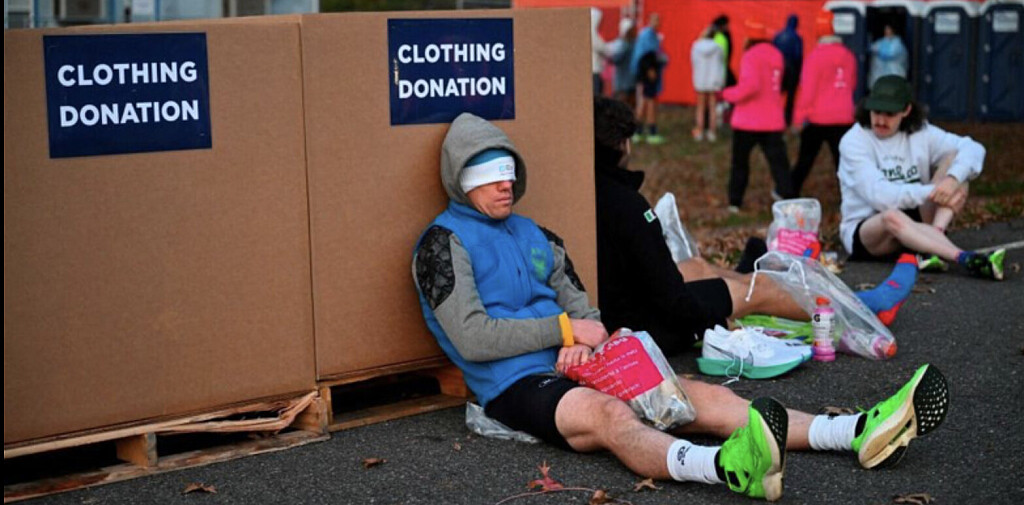Running News Daily
Running News Daily is edited by Bob Anderson in Los Altos California USA and team in Thika Kenya, La Piedad Mexico, Bend Oregon, Chandler Arizona and Monforte da Beira Portugal. Send your news items to bob@mybestruns.com Advertising opportunities available. Train the Kenyan Way at KATA Kenya. (Kenyan Athletics Training Academy) in Thika Kenya. KATA Portugal at Anderson Manor Retreat in central portugal. Learn more about Bob Anderson, MBR publisher and KATA director/owner, take a look at A Long Run the movie covering Bob's 50 race challenge.
Index to Daily Posts · Sign Up For Updates · Run The World Feed
Early Morning Race Start? Here’s How to Reset Your Sleep Schedule
Training plans include time and distance on your feet, but rarely do they block out time in bed—maybe it’s time they do.
At first glance, the start times of most marathons—around 9 a.m. or 10 a.m.—seem easy enough. But when you factor in travel and wait time, runners often have to leave their home or hotel rooms before dawn to get to the start. That leaves typical sleep schedules in the dust.

“I had four races last year and all of them required getting up as early as 3:30 a.m.,” Joe English, elite-level master’s multi-sport athlete and former national coach for the Leukemia and Lymphoma Society’s Team-In-Training program, tells Runner’s World. Especially for the bigger races, where there are a lot of logistics involved, it’s necessary to get up and race super early.
So if you need to reset your sleep schedule before a race to accommodate those pre-dawn times, how do you do it and how long will it take?
Why You Should Reset Your Sleep Schedule
“Sleep used to take a back seat to exercise and nutrition, but in the past decade, we’re starting to realize that it’s really a tripod when it comes to athletic success,” James Maas, Ph.D., author of Sleep to Win: Secrets to Unlocking Your Athletic Excellence in Every Sport tells Runner’s World. “I have personally seen runners who adjusted their sleep and nothing else and have greatly improved their running as a result.”
Extensive research confirms this observation. A systematic review published in Sports Medicine in 2023 about sleep and athletic performance, found that while elite athletes feel rested with eight hours of sleep every night, they often sleep less than seven. Long travel and resting in unfamiliar environments often disrupted their sleep, as did the same things that keep many of us awake: social demands, work and family commitments, and lifestyle choices like diet.
The researchers also found, though, that extending sleep by about 45 minutes to two hours, rather than napping, improved both sleep quality and performance, as shown by metrics like strength and power.
To gain the same benefits, here’s how long it takes to reset your sleep schedule in order to wake up early for a race and how to make it happen so you’re ready for a solid performance.
How to Reset Your Sleep Schedule
If there is a race in your schedule that involves travel crossing time zones, both experts say it takes up to four weeks to adjust your sleep schedule, so start planning for that new wake-up time well in advance.
Here’s what you should do to adjust:
1. Set an Alarm—for Bedtime
You may have the best intentions to go to bed at a reasonable hour, but then OME (One More Episode) Syndrome sets in. Set an alarm to tell you it’s time to wind down.
Consider taking 30 minutes to an hour to move from your couch to your bed, giving yourself enough time to take care of that process. “I have an alarm that goes off at 9:15 every night and that’s when I know to start my wind-down time no matter what,” Ryan Hurley, a sleep performance coach and former ultramarathoner and Ironman racer tells Runner’s World.
2. Create a Consistent Routine
Part of good sleep hygiene—creating the ideal environment for getting a good night’s rest—is consistency. “If your focus is on having a regular sleep cycle all the time, an early race is going to have less of an impact, because you’ll be better rested [overall] and therefore more capable of dealing with that bump in the road,” says English. To help keep him consistent, English sets his lights to automatically dim at the same time in the evening to cue his bedtime.
3. Write Tomorrow’s To-Do List
Writing down your to-do list for the next day before you go to bed can help keep nighttime ruminating at bay. “By writing it down, you’re making space for it but you’re not bringing it into the bedroom with you to worry about,” says Hurley.
4. Act as Your Own Sleep Detective
Tracking your sleep can change your rest game in ways you don’t even yet realize, says Hurley. “I always thought that I was getting enough sleep because I was getting seven hours, and the common recommendation is seven to nine hours,” he says. “But it wasn’t until I started tracking my sleep that I realized I wasn’t getting enough REM sleep.”
“I’ve found that people aren’t very good at judging how much sleep they got,” Maas adds.
To assess your rest, ask yourself these questions: Do you tend to feel tired when you’re in a warm room, a dull meeting, have a heavy meal, or after a couple drinks? Do you typically fall asleep within five minutes of hitting your pillow? Do you sleep extra hours on the weekend? Do you need an alarm to wake up? If yes to any of these, you probably need more rest, he says.
5. Get Grateful
Having an “attitude of gratitude” sounds like a nice catch-all phrase we hear a lot these days, but it can actually help turn your mood around. “Every night, I review the good things that happened to me that day, and it helps puts me into a good mindset to fall asleep,” says Hurley.
6. Replicate Start Times
Replicating race conditions—which includes time of day—can help your body adjust by the time you hit the start. “You should do at least some portion of your training at the time of day of your race,” says English. “It helps acclimate you to running under the conditions in which you’ll be racing.”
How to Schedule Your Sleep the Night Before a Race
If adjusting your sleep schedule for four weeks before a race is unrealistic, English emphasizes that it’s likely, with the help of adrenaline, you’ll be able to push through a race on less sleep than usual. It’s more important to be well-rested the two weeks leading up to the race. Then, if you can, squeeze in a nap if you know you won’t get a full night’s rest before the race.
If you don’t sleep well the night before, don’t let it derail you. Instead focus on the training you’ve done to remind you that you’re ready for the race, English suggests.
To make sure you get the best sleep possible in the days leading up to the start to support your performance, here’s what to do:
Stay Awake Until Bedtime
If you have a 3 a.m. wake-up call, simple math would deduce that you should go to bed much earlier that night. Not so, says English. “The number one thing runners would tell me the night before the big race is ‘I’m going to go to bed at 4 p.m.,’ and I tell them that is a recipe for a disaster, because you’re going to confuse your body into thinking you’re taking a nap, and will wake up after two to three hours,” he says. “My advice instead is to go to bed at a reasonable hour, but not more than an hour or two earlier than normal.”
Go With the Flow
Whether it’s a 24-hour relay, a time zone change, or simply a super-early start time that you couldn’t prepare for, there will be some races that basically happen in your middle of the night. “I remember once I was at the Disney World Marathon which has a really early start, and I was on the bus at 3 a.m., which was midnight my time, and here I was just about to start running,” recalls English. Times like that, there’s only so much you can do, he says. “Just do what you can, and know that your training will carry you through.”
Make Time for a Well-Timed Nap
When you can’t get a full night’s rest, count on the power of a short-and-sweet nap. “Napping can increase your alertness, reaction time, and coordination,” says Maas, who coined the term “power nap.” The sweet spot for nap timing is less than 30 minutes or more than 90 minutes, according to Maas. “Otherwise, you’ll be groggy,” he says
Don’t Sweat the Alarm
The “will I wake up for the race?” panic is so ubiquitous that Jerry Seinfeld was put in charge of waking up a New York City Marathon runner who famously slept through his Olympic race. But let’s separate fact from fiction: According to English, this scenario likely won’t happen. “I’ve probably helped 5,000 runners reach the starting line of a race and I don’t recall anyone oversleeping,” he says. “If anything, it’s the opposite—they’re up at 2 a.m. because of the adrenaline.”
(03/30/2024) Views: 3,253 ⚡AMP
by Runner’s World




